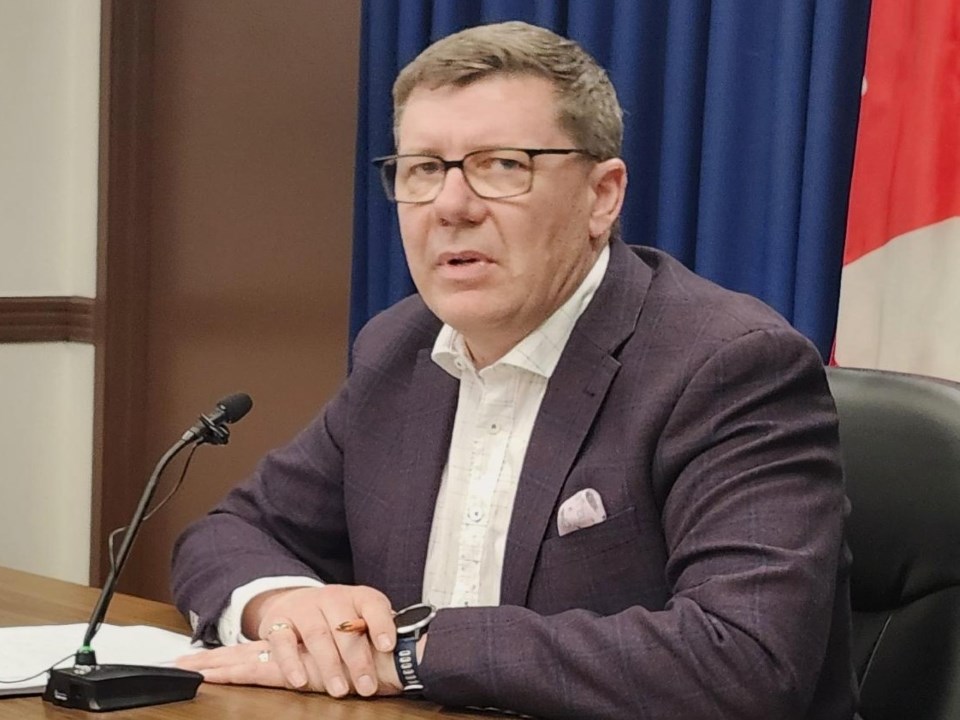SASKATOON — Premier Scott Moe reiterated his government’s declaration of war against fentanyl, joining the federal government in increasing monitoring of possible points of entry of the dangerous drug and other illegal substances in the province.
Prime Minister Justin Trudeau last week appointed Harvard Law School-educated Kevin Brosseau as the country’s first Fentanyl Czar as part of the federal government’s $1.3 billion investment to improve border security to prevent harmful substances from entering the country.
Answering questions from local journalists in Saskatoon Wednesday, Moe said that he shares the concerns of the other premiers and the federal government in the menace brought by illegal substances like fentanyl in communities across the country.
That's why you've seen provincial investment and credit to the federal government’s significant investment. We need to continue to do more to eradicate fentanyl from our communities,” said Moe during a press briefing on Tuesday, Feb. 19 at the Saskatchewan Cabinet Office.
“When it comes to this poison that is killing people that live in our province, our nation, our communities—all too often our friends and family members—fentanyl has no place in Saskatchewan, and we are going to be looking at every effort to eradicate it from the province and do what we can to do the same across Canada.”
U.S. President Trump has repeatedly claimed that fentanyl and crystal meth have also been entering their country, aside from Mexico, through the northern border, accusing Canada of having a lax approach when it comes to preventing illegal drugs and migrants.
However, the Canadian Border Services Agency has seized more illegal drugs and prohibited firearms and weapons from crossing from the U.S. to Canada. Early this year, the RCMP and Ministry of Corrections, Policing and Public Safety’s Provincial Protective Services made significant seizures of illegal drugs at the Saskatchewan-U.S. border.
The Saskatoon Police Service has also ramped up its traffic stops, arrests and seizures of illegal drugs like fentanyl, cash related to trafficking and other deadly weapons in their routine patrols in the city.
Moe said border and other law enforcement officers should concentrate on three points of entry that drug traffickers may use in bringing illegal substances to the country.
“One is the 49th parallel, points of entry and exit. There are also our port facilities, which need to be more closely monitored as well when it comes to precursor drugs and things that can be used to make fentanyl, as well as our airports that need to be closely examined. We must have an ongoing conversation with our federal government on how we are guarding ourselves from the entry of these drugs,” said Moe.
“But there's more that we can do locally at the provincial level as well, whether it be fentanyl or crystal meth, things of those nature, in eradicating those from our communities. They are most certainly the drivers of crime. They are in many ways associated with and the drivers of some of the homelessness and social challenges that we see in our communities. We can do better as a provincial government and intend to do so.”
“We much have a parallel approach when it comes to how are we going to make our communities safer than they are today. One is to provide recovery opportunities. Two is to increase the enforcement, whether that's the increase of close to 400 police officers in our streets,” said Moe.
“Whether it be looking at what we can do to eradicate poisonous drugs like crystal meth and fentanyl from our province and ultimately from the hands of those that are living in our communities. That will go a long way, a long way to making for safer communities in the province of Saskatchewan.”
He added provincial leaders, regardless of party affiliation, should be united in combating illegal drugs in their constituencies, listening to the people from their caucus and those living in their communities.



